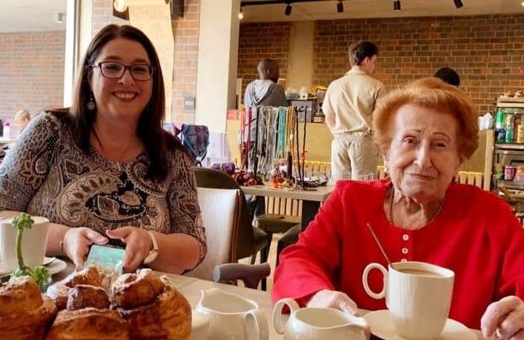click to dowload our latest edition
CLICK HERE TO SUBSCRIBE TO OUR NEWSLETTER


Published
5 years agoon
By
adminMIRAH LANGER
“It’s no longer being asked if these generations were affected, but how,” says Brenda Solarsh, a social worker and the co-ordinator of the soon to be launched Descendants Programme at the Johannesburg Holocaust & Genocide Centre (JHGC).
Solarsh says “intergenerational trauma” has been traced within families that were directly touched by atrocities like the Holocaust and other genocides.
“The truth is that you can’t grow up without being impacted. In many ways, it’s [about learning] resilience, and in some ways, it’s the trauma. There is a need to look at all these facets.”
Leah Gilbert and Janice Leibowitz, both second-generation survivors and members of the programme’s steering committee, note that South Africa was often quite an isolating space for survivors and their families.
Gilbert, whose parents survived the Warsaw Ghetto and a labour camp in Syktyvkar, Russia, recounted how when her family moved to Israel when she was a child, having a Holocaust background was a known reality.
“In Israel, we had a community of survivors. In my case, all my friends were similar. We all didn’t have grandparents, we didn’t have many uncles.”
Yet, in contrast, growing up as a survivor or a relative of a survivor was a relatively solitary, lonely experience in South Africa.”
Leibowitz, whose father survived the Budapest ghetto, and whose aunt survived the Ravensbrück concentration camp, identified with the sense that there was something different about her family compared to the others around her in suburban Johannesburg.
“You observe certain behaviours, but you have no idea. You just think, ‘Well, ok, so I have a weird father or aunt’.”
She suggests that as a result of this kind of childhood socialisation, descendants often position themselves on opposite ends of the scale.
Some feel that they have an absolutely vital role to play in society, but others feel they have been “force-fed” so much about the atrocities, they don’t want further engagement.
Gilbert says she can relate to those who don’t want to talk more about the Holocaust. “At one stage, I was ‘Holocausted’ out. It was my daughter, the third generation, who started working on it.”
Gilbert’s daughter is now a professor of Modern Jewish History at University College London.
“Then I couldn’t ignore it,” she says. “She kept saying, ‘I did it for safta (granny).’”
Both sentiments of descendants – engagement with and detachment from the Holocaust – should be further discussed, says Gilbert, Leibowitz, and Solarsh.
“It’s time to hear what they feel, and what they have to say. I think a lot of them have [the feeling] that they weren’t listened to. We would like to hear them,” says Leibowitz.
Indeed, Tali Nates, the head of the JHGC, believes the timing is right for the establishment of a descendant’s group at the centre.
“Our survivors group started about 20 years ago. Now, the reality is that Holocaust survivors are ageing. It becomes clear that we need to start talking to descendants,” says Nates, herself a second-generation survivor after her father was saved by Oskar Schindler.
She says that the aim, agenda, and activities of the group will be determined by what its participants want.
The first step is to establish a database of how many descendants there are in Johannesburg and South Africa at large.
Descendants are defined as those of the second, third, and fourth generation of a family member who has had a direct lived experience shaped by the upheavals during the Holocaust. This doesn’t only include camp survivors, but those who were in hiding or were displaced or had their lives disrupted in other ways.
Going forward, Gilbert suggests two focus areas for the group.
“One caters for the needs of the descendants. The other makes sure other people hear about the Holocaust as well as other genocides to counteract Holocaust denialism and learn the lessons.”
It’s clear that people, particularly children, best identify with history when it’s linked to a personal story. This is an educational role descendants can play.
“It’s a privilege to hear direct survivor’s stories, but the next best thing is to hear it from descendants,” says Leibowitz.
Solarsh suggests it’s important to tie this in with the role of the JHGC as a “centre of memory”. It’s exciting to explore the diverse ways memory can be captured. For example, the arts have been a key channel through which many second-generation survivors have expressed the particularities of their experience.
They emphasise that even those descendants who don’t want to participate actively should still make contact. “The purpose of launching this group is to find out who the other people are, and listen to their voice,” says Gilbert.
The programme isn’t about providing therapy, but it does offer a “safe space”.
“Descendants are not going to be judged or labelled based on any experiences that they have had growing up,” says Leibowitz.
The Descendants Programme is to be launched at an event at the JHGC in Parktown on 15 September. Those interested can contact bobron@mweb.co.za.

Louise Todres
Sep 5, 2019 at 11:53 am
‘First generation of holocaust survivor.Mother liberated at Bergen Belsen.’